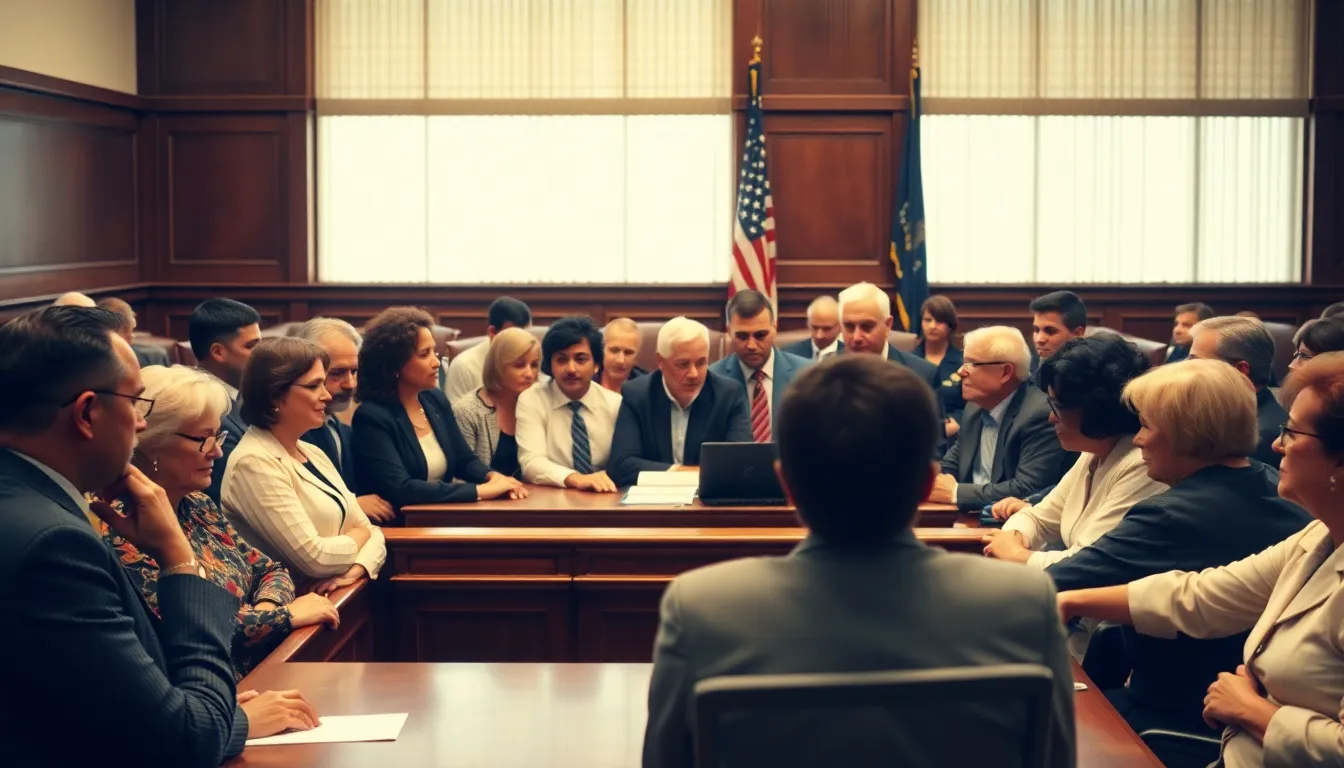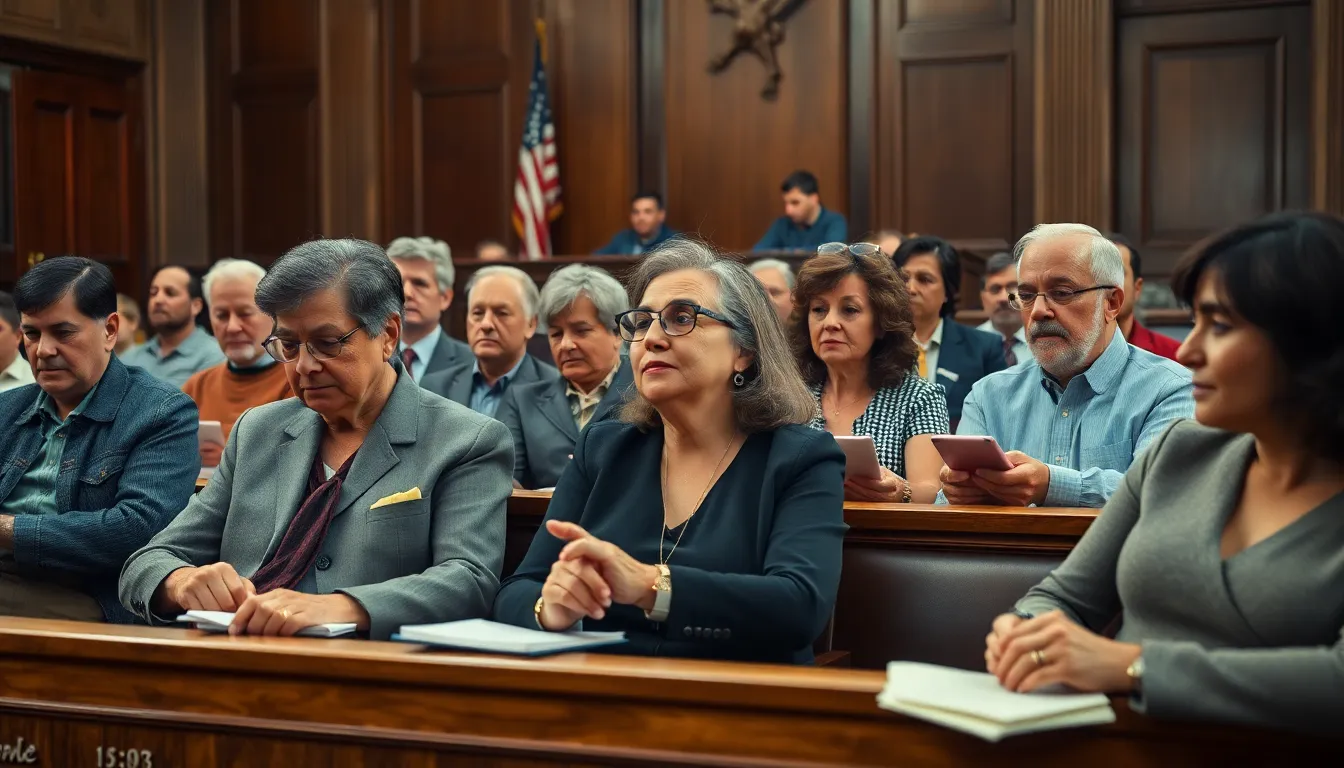The 7th Amendment might not be the star of the Bill of Rights, but it’s the unsung hero of the courtroom. Picture this: you’re in a legal showdown, and the stakes are high. What’s your secret weapon? The right to a jury trial in civil cases, of course! This amendment ensures that ordinary citizens, not just legal eagles, get to weigh in on disputes.
But what does it really mean in today’s world? It’s more than just a fancy piece of paper; it’s a safeguard against arbitrary rulings and a nod to the power of the people. So, buckle up as we dive into the fascinating realm of the 7th Amendment, where justice meets democracy, and find out why it matters now more than ever.
Table of Contents
ToggleUnderstanding the 7th Amendment
The 7th Amendment plays a vital role in American legal principles. It ensures the right to a jury trial in civil cases, contributing to citizens’ participation in the justice system.
Historical Context
The 7th Amendment emerged from early American disputes over civil liberties. Influenced by English common law, this amendment reflects the Founding Fathers’ desire to prevent tyranny. The inclusion of the amendment in 1791 signified a commitment to individual rights. Tensions during the Revolutionary War highlighted the need for a fair legal process. Ordinary citizens felt empowered by the assurance of a jury trial, fostering trust in the judiciary.
Key Provisions
The 7th Amendment guarantees specific legal rights. It applies to civil cases where the amount in controversy exceeds twenty dollars. Citizens can demand a jury trial when involved in lawsuits regarding property, contracts, or torts. The amendment strengthens the principle of impartiality, as jurors come from the community. Important rights afforded by this amendment act as a safeguard against unjust rulings. Civil cases benefit from the thorough examination of evidence by peers.
Importance of the 7th Amendment

The 7th Amendment plays a vital role in protecting civil rights. It guarantees the right to a jury trial in civil cases, empowering individuals. By ensuring jury involvement, it promotes fairness and community participation in legal matters. This involvement acts as a counterbalance to potential government or corporate overreach. Jurors come from the community, reflecting the values and norms of everyday citizens, thereby enhancing trust in the legal system.
Protection of Civil Rights
Protection of civil rights stems from the 7th Amendment’s guarantee of a jury trial. This provision prevents arbitrary rulings by allowing ordinary citizens to judge disputes. Individuals facing legal action gain the right to have their cases heard by impartial peers. Community representation in juries strengthens individual rights against injustice and discrimination. Civil liberties benefit from this check on authority, requiring that decisions resonate with the experiences of those directly affected.
Influence on Legal Proceedings
The 7th Amendment influences legal proceedings by establishing clear guidelines for civil cases. It applies to disputes involving amounts exceeding twenty dollars, ensuring accessibility to jury trials. The necessity for jurors to evaluate evidence fosters thorough investigations, which enhances verdict quality. Decisions rendered by juries reflect societal values, encouraging fairness in civil litigation. Additionally, the amendment shields defendants from potentially biased judicial outcomes, preserving integrity in the judicial process.
Common Misconceptions
Misunderstandings about the 7th Amendment often circulate in discussions and debates. Clarifying these misconceptions can enhance the understanding of this critical legal protection.
Myths About the 7th Amendment
Many people believe the 7th Amendment only applies to criminal cases. In reality, it specifically addresses civil cases, guaranteeing the right to a jury trial when the dispute involves over twenty dollars. Another common myth suggests that jury trials in civil cases are always preferable. While they provide citizen involvement, they’re not always mandatory for every type of civil litigation. The amendment does not apply to all civil disputes, only those meeting established financial thresholds.
Clarifying Misunderstandings
The 7th Amendment doesn’t eliminate judges’ roles in civil trials, a frequent assumption. Judges still oversee proceedings and ensure legal standards are followed. Misinterpretations also exist regarding the requirement of unanimous jury decisions. Unlike criminal cases, civil jury verdicts often don’t require unanimous consent, depending on state laws. Furthermore, some individuals think the amendment is a modern creation, while its roots trace back to English common law and the Founding Fathers’ intentions to protect individual rights.
Impact on Modern Law
The 7th Amendment continues to shape the legal landscape today, ensuring citizens’ rights in civil cases. Its influence is evident in various case studies that illustrate the principles enshrined by this amendment.
Case Studies
Numerous case studies highlight the significance of the 7th Amendment in contemporary law. A notable example involves Czaja v. Williams, where jurors assessed damages arising from a breach of contract. Here, the jury’s verdict underscored the importance of community involvement in legal outcomes. Another significant case, Sullivan v. New York Times, emphasized the role of juries in determining issues of defamation, showcasing their ability to reflect societal standards. These cases demonstrate how the amendment bolsters fairness in trials, ensuring that community perspectives play a vital role in resolving disputes.
Current Relevance
Current legal practices still reflect the core values of the 7th Amendment. Many courts uphold the right to a jury trial in civil cases exceeding twenty dollars, emphasizing its foundational importance. Judges often recognize this right during pretrial motions, setting the stage for jury involvement. Additionally, public awareness surrounding the amendment has grown, as citizens increasingly understand the rights afforded to them in legal proceedings. Legal professionals consistently advocate for jury trials, reinforcing the amendment’s status in the quest for justice and fairness in today’s society.
The 7th Amendment stands as a vital cornerstone of American legal rights. It not only guarantees the right to a jury trial in civil cases but also empowers citizens to actively participate in the justice system. This amendment fosters a sense of community involvement and ensures that legal decisions reflect societal values.
As society evolves the principles embedded in the 7th Amendment remain crucial. They protect against arbitrary rulings and promote fairness in legal proceedings. With a continued emphasis on civil rights and community participation the 7th Amendment’s relevance endures. Understanding its implications helps citizens navigate the complexities of the legal landscape while reinforcing their rights in civil matters.



